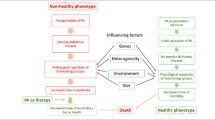Abstract
Purpose
In this proof-of-concept pilot study, our purpose was to determine correlations between gut microbiota composition and alterations in cardiorespiratory fitness and psychosocial outcomes among post-primary treatment breast cancer survivors (BCS).
Methods
Composition of the gut microbiota in BCS (n = 12) was assessed at baseline (M0) and at the end of 3 months (M3) using Illumina MiSeq DNA Sequencing of the 16S rRNA gene. Gut microbiota composition was analyzed using the QIIME bioinformatics software and represented through diversity metrics and taxa analyses. Cardiorespiratory fitness, fatigue, anxiety, depression, and sleep dysfunction were assessed at M0 and M3 via the submaximal treadmill test, Fatigue Symptom Inventory, Hospital Anxiety and Depression Scale, and Pittsburgh Sleep Quality Index, respectively.
Results
Increased fatigue interference in BCS was associated with increased mean within-sample Shannon diversity (organism richness and evenness) (p = 0.009). Weighted UniFrac analysis (shifts in taxa relative abundance) revealed significant differences in between-sample (beta) diversity for changes in fatigue interference (p = 0.01) and anxiety (p = 0.022), with a trend observed for fatigue intensity and sleep dysfunction (p < 0.1). Unweighted UniFrac analysis (shifts in taxa types) found significant beta diversity differences for cardiorespiratory fitness (p = 0.026). Prior to false discovery correction (FDR), changes in fitness, fatigue, anxiety, and sleep dysfunction were associated with the frequency of certain gut bacteria genera (e.g., Faecalibacterium, Prevotella, Bacteroides) (p < 0.05).
Conclusions
Correlations may exist between alterations in gut microbiota composition and longitudinal changes in cardiorespiratory fitness, fatigue, and anxiety in BCS. Further research examining the role of the microbiota-gut-brain axis in exercise-induced effects on psychosocial outcomes in BCS is warranted.

Similar content being viewed by others
References
DeSantis CE, Lin CC, Mariotto AB, Siegel RL, Stein KD, Kramer JL, Alteri R, Robbins AS, Jemal A (2014) Cancer treatment and survivorship statistics, 2014. CA Cancer J Clin 64:252–271
Knobf MT (2011) Clinical update: psychosocial responses in breast cancer survivors. Semin Oncol Nurs 27:e1–e14
McNeely ML, Campbell KL, Rowe BH, Klassen TP, Mackey JR, Courneya KS (2006) Effects of exercise on breast cancer patients and survivors: a systematic review and meta-analysis. CMAJ 175:34–41
McTiernan A (2008) Mechanisms linking physical activity with cancer. Nat Rev Cancer 8:205–211
Moylan S, Eyre HA, Maes M, Baune BT, Jacka FN, Berk M (2013) Exercising the worry away: how inflammation, oxidative and nitrogen stress mediates the beneficial effect of physical activity on anxiety disorder symptoms and behaviours. Neurosci Biobehav Rev 37:573–584
Collins SM, Surette M, Bercik P (2012) The interplay between the intestinal microbiota and the brain. Nat Rev Microbiol 10:735–742
Petra AI, Panagiotidou S, Hatziagelaki E, Stewart JM, Conti P, Theoharides TC (2015) Gut-microbiota-brain axis and its effect on neuropsychiatric disorders with suspected immune dysregulation. Clin Ther 37:984–995
Bermon S, Petriz B, Kajeniene A, Prestes J, Castell L, Franco OL (2015) The microbiota: an exercise immunology perspective. Exerc Immunol Rev 21:70–79
Clarke SF, Murphy EF, O'Sullivan O, Lucey AJ, Humphreys M, Hogan A, Hayes P, O'Reilly M, Jeffery IB, Wood-Martin R, Kerins DM, Quigley E, Ross RP, O'Toole PW, Molloy MG, Falvey E, Shanahan F, Cotter PD (2014) Exercise and associated dietary extremes impact on gut microbial diversity. Gut 63:1913–1920
Estaki M, Pither J, Baumeister P, Little JP, Gill SK, Ghosh S, Ahmadi-Vand Z, Marsden KR, Gibson DL (2016) Cardiorespiratory fitness as a predictor of intestinal microbial diversity and distinct metagenomic functions. Microbiome 4:42
McAuley E, White SM, Rogers LQ, Motl RW, Courneya KS (2010) Physical activity and fatigue in breast cancer and multiple sclerosis: psychosocial mechanisms. Psychosom Med 72:88–96
Touchefeu Y, Montassier E, Nieman K, Gastinne T, Potel G, des Bruley VS, Le Vacon F, de La Cochetiere MF (2014) Systematic review: the role of the gut microbiota in chemotherapy- or radiation-induced gastrointestinal mucositis—current evidence and potential clinical applications. Aliment Pharmacol Ther 40:409–421
Vance V, Mourtzakis M, McCargar L, Hanning R (2011) Weight gain in breast cancer survivors: prevalence, pattern and health consequences. Obes Rev 12:282–294
Kelly JR, Kennedy PJ, Cryan JF, Dinan TG, Clarke G, Hyland NP (2015) Breaking down the barriers: the gut microbiome, intestinal permeability and stress-related psychiatric disorders. Front Cell Neurosci 9:392
Jiang H, Ling Z, Zhang Y, Mao H, Ma Z, Yin Y, Wang W, Tang W, Tan Z, Shi J, Li L, Ruan B (2015) Altered fecal microbiota composition in patients with major depressive disorder. Brain Behav Immun 48:186–194
Messaoudi M, Lalonde R, Violle N, Javelot H, Desor D, Nejdi A, Bisson JF, Rougeot C, Pichelin M, Cazaubiel M, Cazaubiel JM (2011) Assessment of psychotropic-like properties of a probiotic formulation (Lactobacillus helveticus R0052 and Bifidobacterium longum R0175) in rats and human subjects. Br J Nutr 105:755–764
Rao AV, Bested AC, Beaulne TM, Katzman MA, Iorio C, Berardi JM, Logan AC (2009) A randomized, double-blind, placebo-controlled pilot study of a probiotic in emotional symptoms of chronic fatigue syndrome. Gut Pathog 1:6
Tillisch K, Labus J, Kilpatrick L, Jiang Z, Stains J, Ebrat B, Guyonnet D, Legrain-Raspaud S, Trotin B, Naliboff B, Mayer EA (2013) Consumption of fermented milk product with probiotic modulates brain activity. Gastroenterology 144:1394–1401 1401 e1391-1394
Rogers LQ, McAuley E, Anton PM, Courneya KS, Vicari S, Hopkins-Price P, Verhulst S, Mocharnuk R, Hoelzer K (2012) Better exercise adherence after treatment for cancer (BEAT Cancer) study: rationale, design, and methods. Contemp Clin Trials 33:124–137
Zigmond AS, Snaith RP (1983) The hospital anxiety and depression scale. Acta Psychiatr Scand 67:361–370
Buysse DJ, Reynolds CF 3rd, Monk TH, Berman SR, Kupfer DJ (1989) The Pittsburgh Sleep Quality Index: a new instrument for psychiatric practice and research. Psychiatry Res 28:193–213
Kumar R, Eipers P, Little RB, Crowley M, Crossman DK, Lefkowitz EJ, Morrow CD (2014) Getting started with microbiome analysis: sample acquisition to bioinformatics. Curr Protoc Hum Genet 82:18 18 11–18 18 29
Lozupone C, Knight R (2005) UniFrac: a new phylogenetic method for comparing microbial communities. Appl Environ Microbiol 71:8228–8235
Tyler AD, Smith MI, Silverberg MS (2014) Analyzing the human microbiome: a “how to” guide for physicians. Am J Gastroenterol 109:983–993
Goedert JJ, Jones G, Hua X, Xu X, Yu G, Flores R, Falk RT, Gail MH, Shi J, Ravel J, Feigelson HS (2015) Investigation of the association between the fecal microbiota and breast cancer in postmenopausal women: a population-based case-control pilot study J Natl Cancer Inst 107
Montassier E, Gastinne T, Vangay P, Al-Ghalith GA, des Bruley VS, Massart S, Moreau P, Potel G, de La Cochetiere MF, Batard E, Knights D (2015) Chemotherapy-driven dysbiosis in the intestinal microbiome. Aliment Pharmacol Ther 42:515–528
Irwin ML, McTiernan A, Bernstein L, Gilliland FD, Baumgartner R, Baumgartner K, Ballard-Barbash R (2004) Physical activity levels among breast cancer survivors. Med Sci Sports Exerc 36:1484–1491
Zhang FF, Liu S, John EM, Must A, Demark-Wahnefried W (2015) Diet quality of cancer survivors and noncancer individuals: results from a national survey Cancer 121: 4212–4221
Dainese R, Serra J, Azpiroz F, Malagelada JR (2004) Effects of physical activity on intestinal gas transit and evacuation in healthy subjects. Am J Med 116:536–539
al Majid S, McCarthy DO (2001) Cancer-induced fatigue and skeletal muscle wasting: the role of exercise. Biol Res Nurs 2:186–197
David LA, Maurice CF, Carmody RN, Gootenberg DB, Button JE, Wolfe BE, Ling AV, Devlin AS, Varma Y, Fischbach MA, Biddinger SB, Dutton RJ, Turnbaugh PJ (2014) Diet rapidly and reproducibly alters the human gut microbiome. Nature 505:559–563
Scott KP, Gratz SW, Sheridan PO, Flint HJ, Duncan SH (2013) The influence of diet on the gut microbiota. Pharmacol Res 69:52–60
Kang SS, Jeraldo PR, Kurti A, Miller ME, Cook MD, Whitlock K, Goldenfeld N, Woods JA, White BA, Chia N, Fryer JD (2014) Diet and exercise orthogonally alter the gut microbiome and reveal independent associations with anxiety and cognition. Mol Neurodegener 9:36
Naseribafrouei A, Hestad K, Avershina E, Sekelja M, Linlokken A, Wilson R, Rudi K (2014) Correlation between the human fecal microbiota and depression. Neurogastroenterol Motil 26:1155–1162
Shukla SK, Cook D, Meyer J, Vernon SD, Le T, Clevidence D, Robertson CE, Schrodi SJ, Yale S, Frank DN (2015) Changes in gut and plasma microbiome following exercise challenge in myalgic encephalomyelitis/chronic fatigue syndrome (ME/CFS). PLoS One 10:e0145453
Wong ML, Inserra A, Lewis MD, Mastronardi CA, Leong L, Choo J, Kentish S, Xie P, Morrison M, Wesselingh SL, Rogers GB, Licinio J (2016) Inflammasome signaling affects anxiety- and depressive-like behavior and gut microbiome composition Mol Psychiatry
Yamamura S, Morishima H, Kumano-go T, Suganuma N, Matsumoto H, Adachi H, Sigedo Y, Mikami A, Kai T, Masuyama A, Takano T, Sugita Y, Takeda M (2009) The effect of Lactobacillus helveticus fermented milk on sleep and health perception in elderly subjects. Eur J Clin Nutr 63:100–105
Barsevick AM (2007) The concept of symptom cluster. Semin Oncol Nurs 23:89–98
Fiorentino L, Rissling M, Liu L, Ancoli-Israel S (2011) The symptom cluster of sleep, fatigue and depressive symptoms in breast cancer patients: severity of the problem and treatment options. Drug Discov Today Dis Models 8:167–173
Cervantes J (2016) Use your antibiotics wisely. Consequences to the intestinal microbiome FEMS Microbiol Lett 363
Blanchard CM, Courneya KS, Stein K, American Cancer Society’s SCS, II (2008) Cancer survivors’ adherence to lifestyle behavior recommendations and associations with health-related quality of life: results from the American Cancer Society’s SCS-II. J Clin Oncol 26:2198–2204
Acknowledgements
We acknowledge the following funding sources: R01CA136859, U01CA136859, R25CA76023 (CaRES), R25CA047888 (Cancer Prevention and Control Training Grant), and P30DK056336 (University of Alabama at Birmingham Nutrition Obesity Research Center). We also acknowledge support from the Microbiome Resource at the University of Alabama at Birmingham: School of Medicine, Comprehensive Cancer Center (P30AR050948), Center for AIDS Research (5P30AI027767), Center for Clinical Translational Science (UL1TR000165), Multidisciplinary Clinical Research Center (P60AR064172), and Heflin Center.
Author information
Authors and Affiliations
Corresponding author
Ethics declarations
All procedures performed in studies involving human participants were in accordance with the ethical standards of the institutional and/or national research committee and with the 1964 Helsinki declaration and its later amendments or comparable ethical standards.
Conflicts of interest
Jesseca A. Paulsen and all contributing authors declare they have no personal or professional relationships that may represent a potential conflict of interest.
Electronic supplementary material
ESM 1
(DOCX 162 kb)
Rights and permissions
About this article
Cite this article
Paulsen, J.A., Ptacek, T.S., Carter, S.J. et al. Gut microbiota composition associated with alterations in cardiorespiratory fitness and psychosocial outcomes among breast cancer survivors. Support Care Cancer 25, 1563–1570 (2017). https://doi.org/10.1007/s00520-016-3568-5
Received:
Accepted:
Published:
Issue Date:
DOI: https://doi.org/10.1007/s00520-016-3568-5




